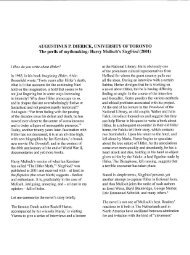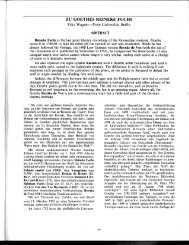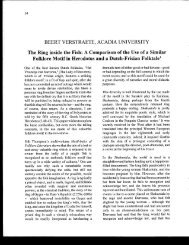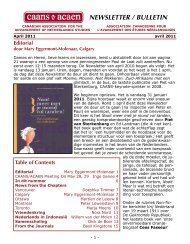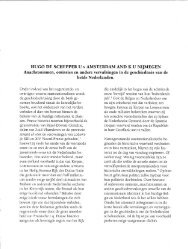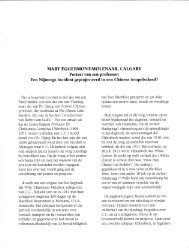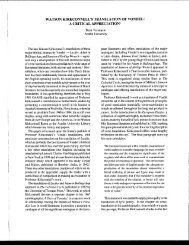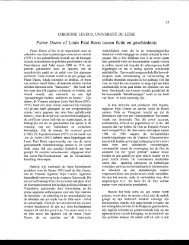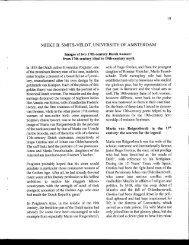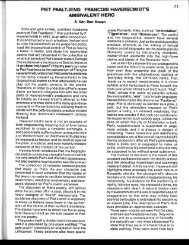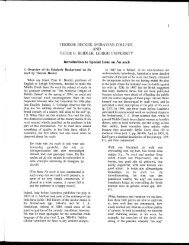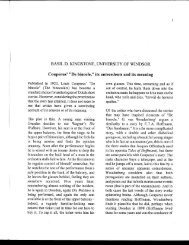Fred J. Nichols - Maria Tesselschade Roemer Visscher (1593-1649)
Fred J. Nichols - Maria Tesselschade Roemer Visscher (1593-1649)
Fred J. Nichols - Maria Tesselschade Roemer Visscher (1593-1649)
Create successful ePaper yourself
Turn your PDF publications into a flip-book with our unique Google optimized e-Paper software.
conquered myself and drove my foe to<br />
flight).3<br />
Just before this time, the Muiderkring had<br />
acquired a distinguished new member,<br />
Caspar van Baerle, better known under the<br />
Latin form of his name, Barlaeus. A former<br />
professor of logic at Leiden and a trained<br />
physician, he was rounding out a<br />
distinguished and animated career as a<br />
professor of philosophy at the Academy in<br />
Amsterdam, and he was a recent widower.<br />
He also enjoyed a considerable reputation<br />
in his time as a writer of Latin verse. He<br />
immediately fell under <strong>Tesselschade</strong>'s spell<br />
-his own play on words, since the Latin<br />
form of her name, Tessela, can also refer to<br />
Thessaly, a region notorious in antiquity for<br />
its witches--and proposed to her in 1636.<br />
That she turned him down, attached as she<br />
remained to her dead husband's memory,<br />
did nothing to dampen his ardor.<br />
<strong>Tesselschade</strong>'s accomplishments did not<br />
include a knowledge of Latin, and this put<br />
him at somewhat of a disadvantage. As he<br />
himself observed in a letter to Huygens<br />
(qtd. in Worp 148), he felt far more<br />
comfortable writing poetry in Latin than in<br />
Dutch, which meant that his poetic<br />
compliments to <strong>Tesselschade</strong> had to be<br />
translated for her. On the other hand, he<br />
and Huygens took advantage of her not<br />
knowing the language to occaSionally<br />
exchange Latin poems of a decidedly gamy<br />
character about her. Hooft and Huygens<br />
encouraged Barlaeus in his hopeless<br />
campaign; it seems to have amused them.<br />
But the independent-minded woman again<br />
confounded her admirers by a decisive step.<br />
Sometime around the beginning of 1642, she<br />
converted to Roman Catholicism. This was<br />
not a sudden move. Her sister Anna, now<br />
also a widow, had converted to Catholicism,<br />
and there is evidence that <strong>Tesselschade</strong> had<br />
felt a growing sympathy for that religion, to<br />
which the poet Vondel had also converted<br />
in 1641. This conversion had the effect of<br />
placing her out of reach as an object of<br />
matrimony of the Protestant widowers<br />
Barlaeus and Huygens. Interestingly<br />
<strong>Maria</strong> <strong>Tesselschade</strong> <strong>Roemer</strong> <strong>Visscher</strong> (<strong>1593</strong>-<strong>1649</strong>) 21<br />
enough it was Huygens, a generally tolerant<br />
man toward Catholics although himself a<br />
convinced Calvinist, who reacted the more<br />
strongly.<br />
Huygens' attitude toward <strong>Tesselschade</strong><br />
remains something of an enigma. He<br />
enjoyed the company of attractive women,<br />
and particularly of/gifted attractive women.<br />
At times he took/ upon himself the role of<br />
Barlaeus' rivaY as her suitor, although<br />
always in a joking vein. Yet his reaction to<br />
her conversion was sharp, even harsh. He<br />
himself said of it, "I don't spare the rod, I<br />
love the child too much" (Worp 261). His<br />
intense campaign to make <strong>Tesselschade</strong> see<br />
the error of her ways and return to what for<br />
him was the true faith, finally stirred this<br />
even-tempered woman to an unusually<br />
pointed retort. In one of the many poems<br />
by her that have been lost, she seems to<br />
have accused Huygens, who was the<br />
secretary to the Stadhouder, the de facto<br />
ruler of the Dutch Republic, of owing his<br />
religious convictions to political expediency<br />
rather than to genuine belief. This stung<br />
Huygens in turn to write one of his most<br />
trenchant sonnets:<br />
Mijn Tong en was noijt veil,<br />
[mijn' Penne noijt verkocht,<br />
Mijn' Handen noijt in strick<br />
[van Goud of Diamanten,<br />
Mijn' Vrijheid noijt verslaeft,<br />
[om met fluweele wanten<br />
De waerheid aen te gaen,<br />
[en anders dan ick docht.<br />
(My tongue was never venal, my pen was<br />
never sold, / My hands never ensnared by<br />
gold or diamonds, / My freedom never<br />
bound,so that with velvet gloves / It went<br />
against the truth, diverging from what I<br />
thought)(Worp 297).<br />
Huygens concludes this burst of indignation<br />
with one of his characteristic plays on<br />
words, addressing his errant friend as<br />
"Beroemde, maar, eilaas, beRoomde<br />
Tesselscha" (Renowned but alas, Romanized<br />
<strong>Tesselschade</strong>).<br />
Yet even this exchange did not shake the



